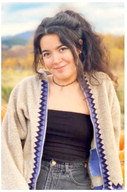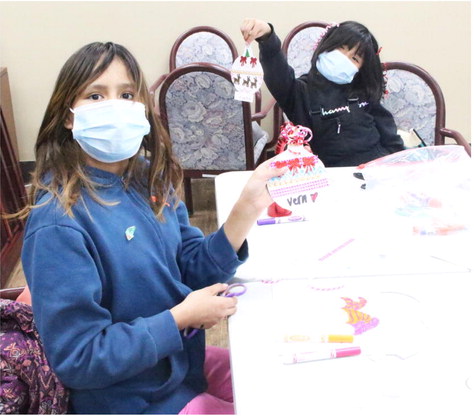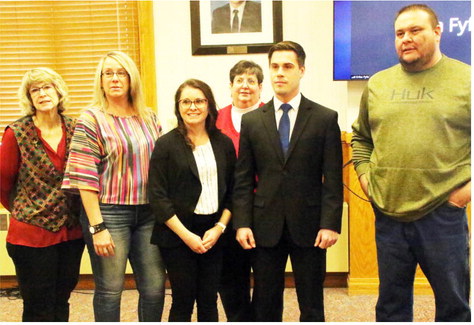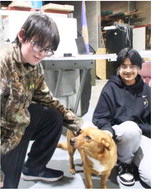MSU Graduate Charts Path To Help Indigenous Communities


When Sophia Moreno arrived at Montana State University in the fall of 2019, she couldn’t have predicted that the academic year would ultimately be reshaped by the onset of the COVID-19 pandemic.
She recalls a feeling of isolation when classes became remote and the struggle of finding a community to connect with during that first year. But looking back, Moreno, who graduated last week with a degree in environmental science, said her time at MSU connected her with a life-changing network of mentors and peers that have shaped the path she envisions for her life.
“I studied environmental science because I felt like my purpose was related to land and people,” said Moreno, who is a member of the Crow and Laguna tribes. “I feel like a lot of Native students, including myself, are brought to our education because of a sense of duty for our community. That was always my intention with my education, to be able to be a part of my community and help my people in whatever way I can.”
Sophia Moreno graduated earlier this month as part of MSU’s class of 2024.
Moreno grew up in Wyola on Montana’s Crow Reservation before moving to Worden, east of Billings, before high school. Her family experienced housing insecurity, struggling to find an affordable place to live in their hometown, which motivated their move farther afield. She attended MSU Billings before her arrival in Bozeman but knew that no matter what she studied, she wanted to positively impact her home community.
Studying in the College of Agriculture’s Department of Land Resources and Environmental Sciences, Moreno took classes in hydrology, environmental law, biogeochemistry and more, creating a well-rounded and interdisciplinary program that touched upon her interests. She also connected with the Buffalo Nations Food Systems Initiative, a collaborative research and education program in the College of Education, Health and Human Development and Department of Native American Studies that focuses on Indigenous food knowledge, history and cultures. The initiative includes student fellowships and oversees several campus gardens as well as a seed bank.
Buffalo Nations connected her with both the students and mentors she’d been looking for, Moreno said, including students from a wide range of degree programs.
“Some people are in nursing or want to be doctors, some are in sociology, but all of those facets are so applicable to the work, because all of that knowledge is needed,” she said.
Jill Falcon Ramaker, assistant professor in the Department of Food Systems, Nutrition and Kinesiology in the College of Education, Health and Human Development, leads Buffalo Nations. She said Moreno took a vested interest in not only learning but also applying what she learned and teaching it to others.
“Sophia is a strong Indigenous woman and a natural leader,” said Falcon Ramaker. “Returning to the Buffalo Nations Summer Fellowship for a second year as a team coordinator, she encouraged new students just coming to the work and mentored them on their own paths to working for buffalo, seeds, food sovereignty and community well-being.”
Moreno became deeply involved in planning events, engaging with other students, and conducting research. She used geographic information systems to create interactive maps that chart the locations of Indigenous nations, tribal colleges and more in a format that allows visitors to learn about Native culture and history around Montana and the surrounding region. She presented her undergraduate research at conferences and submitted her first-ever academic paper for publication. Having received her degree on Friday, May 10, at MSU’s spring commencement, she has ambitious plans for continuing her studies and giving back to her community.
She hopes to attend the University of New Mexico, pursuing a master’s degree from UNM’s Indigenous Design and Planning Institute. Spurred by her own family’s experience with housing insecurity, Moreno explored sustainable building in her undergraduate research with a particular focus on cob, a material made of sand, silt, clay and straw. In one project, she participated in building a home from the ground up, and she wants to pass similar knowledge to others by establishing a program teaching people about food systems and sustainable housing.
“I see it as building a program where you learn as you build, and through that you’re able to carry that set of skills with you. It also allows you to build a connection with the land in a sustainable way,” Moreno said. “All those classes have been useful because being educated in all those areas will help me take those next steps when I do come back to my community. I see that as my path, how all those things blend together.”
Cathy Zabinski, a professor in the Department of Land Resources and Environmental Sciences, said Moreno worked hard to overcome personal challenges, and thanks to high motivation and innate ability, was able to achieve her goals at MSU.
“Sophia brought a unique perspective to class discussions that enriched our learning experience,” Zabinski said.
Moreno said the trajectory she had in mind for herself when she arrived at MSU is not the same as the one she is leaving with. She said the evolution of her knowledge and the many opportunities to engage with diverse topics and people have illuminated the steps she hopes to take. Moreno wants to make her home in Montana better for those who come after her.
She credited Zabinski and Falcon Ramaker for helping her to excel along with Mary Stein, program leader for MSU’s sustainable food and bioenergy systems program, and Kristin Ruppel, an associate professor in the Department of Native American Studies, calling them the definition of ideal mentors.
“They’ve provided so much knowledge, whether that be through life experience or academia. They’ve helped me connect with community and also given me the confidence to do that on my own,” she said. “They’ve really helped me in forming my identity and helped me learn who I want to be through their guidance, their compassion, their knowledge and their enthusiasm. Having those people in my life has been such a gift.”



